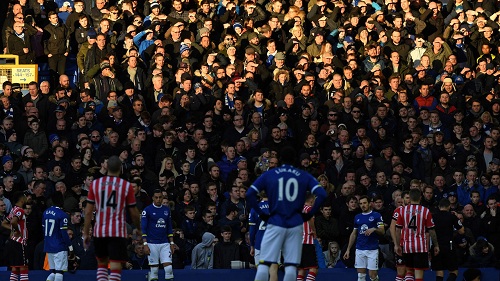This post has already been read 1437 times!
Premier League players are set to be subjected to a strict testing regime if they are to return to training amid the coronavirus pandemic, according to British media reports.
The BBC said Tuesday it had seen a copy of official protocols sent to all 20 Premier League clubs detailing the need for corner-flags, balls, cones, goalposts and even playing surfaces to be disinfected after each training session.
Other measures in the guidance include twice-weekly testing, and a daily pre-training questionnaire and temperature check.
Should a player test positive, with or without symptoms, they will be forced to self-isolate for seven days.
All players will have to travel to a training ground individually and avoid public transport. Once there they will not be allowed to gather in communal areas and won’t be fed on the premises.
Tackling and contact will reportedly be banned for the first phase of team training.
Meanwhile, club medical staff must wear personal protection equipment when treating the players.
A meeting involving players, the Professional Footballers’ Association and the British government over safety and health issues surrounding a possible restart of the game is set to take place on Wednesday.
PFA chief executive Gordon Taylor, said his members would be open to playing again provided “everything that can be done is being done” to assure their safety.
“We’ve got to try it, see if we can do it and see if we can return to some form of activity,” Taylor told the Mirror.
“But it’s also being as careful and having as many assurances as possible that it’s achievable.”
However, England internationals Raheem Sterling and Danny Rose are the two latest high-profile players to raise their concerns over a return to contact sport when the rest of society is being advised to follow social-distancing guidelines.
– ‘Lives at risk’ –
“The moment we do go back it just needs to be a moment where it’s not just for footballing reasons, it’s safe for not just us footballers but the whole medical staff, referees,” Sterling told his YouTube channel.
Meanwhile Rose, on loan at Newcastle from Tottenham, told an Instagram live: “People’s lives are at risk.
“Football shouldn’t even be spoken about coming back until the numbers have dropped massively.”
A further complication for Project Restart is where any matches would be played, with the clubs opposed to a proposal for a limited number of neutral venues to be used.
The UK’s national football policing lead previously stated resuming matches on a home-and-away basis would “present challenges” to the emergency services.
But Mark Roberts said on Tuesday that police, government and football authorities were working together on a plan “which minimises any risks to public safety and unnecessary pressure on public services, but facilitates a sensible restart to the season.”
London Mayor Sadiq Khan has come out against the idea of playing matches in the capital at this stage, with the city having been particularly badly hit by the pandemic.
Five of the 20 Premier League sides are based in London.
“With the country still in the grips of this crisis, and hundreds of people dying every day, he believes that it is too early to be discussing the resumption of the Premier League and top-flight sport in the capital,” Khan’s spokesperson told the Evening Standard.
Premier League clubs face having to pay a huge refund to broadcasters even if they manage to complete the virus-disrupted season behind closed doors.
Broadcasters would be reimbursed for matches not being played as scheduled and the lack of atmosphere in empty stadiums is also a factor.
The BBC reported the bill could be as high as £340 million ($420 million) and would surge to £760 million if the season cannot be completed.
Premier League chief executive Richard Masters has previously warned of a £1 billion loss once the absence of gate receipts is taken into account.
New government guidelines have paved the way for elite sport to return behind closed doors in England from June 1.
Britain has been one of the worst hit by the global pandemic, with the UK government officially recording more than 32,000 deaths from COVID-19.
AFP/Channels



